April 11, 2025 – 54th Day of the 100-Day Dharma Talk, Friday Dharma Q&A
Hello. This is the 54th day of Venerable Pomnyun Sunim’s 100-Day Dharma Talk. Today, a Friday Dharma Q&A session is being held, open to all citizens.

After completing his morning practice and meditation, Sunim headed to the Jungto Social and Cultural Center to conduct the Friday Dharma Q&A. Early in the morning, volunteers were already welcoming citizens who had come to attend the session.


At 10:15 AM, with about 260 people in attendance, the Friday Dharma Q&A began with the recitation of the Three Refuges and Words for Practice. Approximately 3,400 people were connected to the YouTube live stream.

Sunim briefly explained the purpose and format of the Dharma Q&A before starting the session.
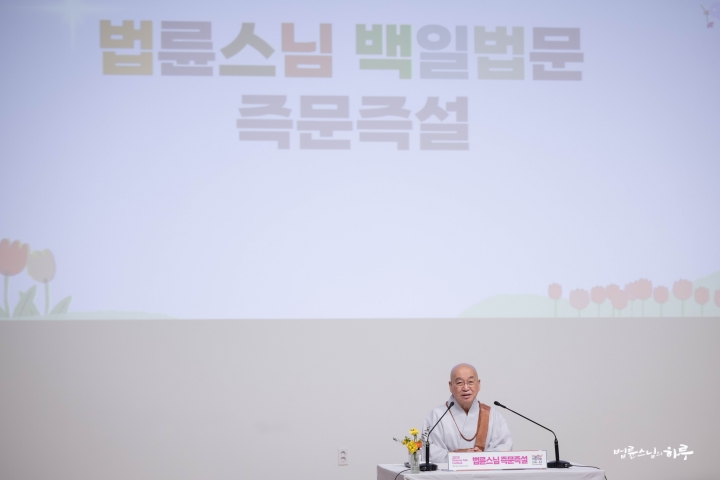
“Dharma Q&A is a place where anyone can express doubts or sufferings in their mind. No preparation is necessary; just speak honestly. However, considering that others are present, please avoid hate speech or excessively long stories. There are no restrictions on topics. Now, let’s begin.”
During the hour and a half session, eight people raised their hands to ask Sunim questions. One person sought advice on how to manage feelings of jealousy about her husband providing too much financial assistance to his parents.
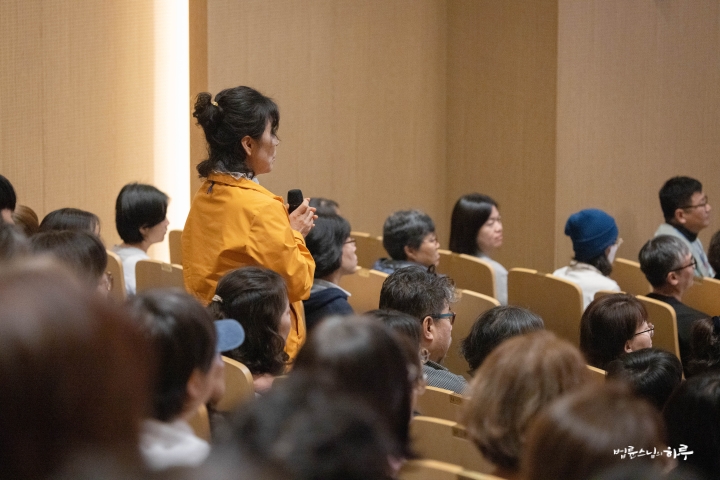
My Husband Gives Too Much Financial Support to His Parents, and It Upsets Me
“Has the questioner ever gone hungry, been unable to buy a house, or been unable to educate your children because your husband helped his parents? Have you suffered any decisive loss like that?”
“No, I haven’t.”
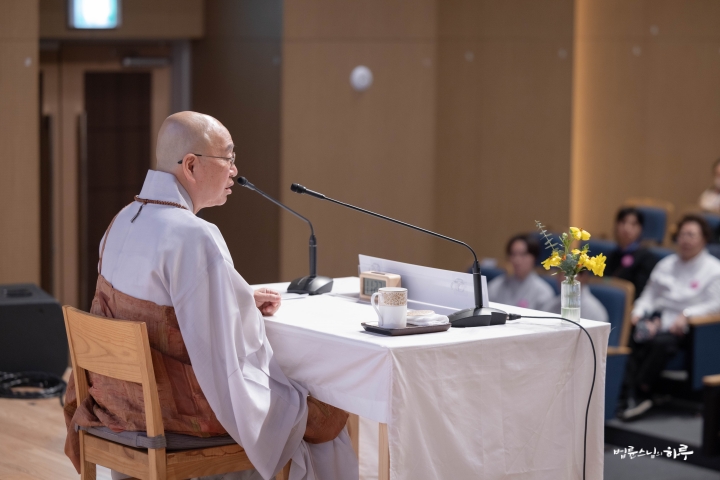
“Then you’re being narrow-minded. No matter how much you try to change your husband, it won’t be easy. So you can only live with the suffering. You’ll have to live with the bad feelings and bear the consequences. It’s foolish behavior, but not bad behavior. Married couples don’t have an obligation to help the husband’s parents, so you’re not a bad person for not wanting to help. But from your husband’s perspective, they are his parents, so he naturally wants to help them. Ultimately, you have two choices: accept the situation or get divorced.
But if you talk about divorce just because you feel bad about helping his parents a little, when there’s no significant financial loss, it would be embarrassing in front of your children and others. Even a judge would think, ‘Is this grounds for divorce?’ as it falls below the average standard. If your husband had squandered money on gambling, lent large sums to friends causing problems, or continuously given money to another woman, causing losses to the family, that would be different. In such cases, it would affect your children’s education and family life, so it could certainly be grounds for divorce.
People judge based on two criteria: first, how much damage was caused, and second, who received the money. In the current situation, people would say, ‘That son is really filial’ or ‘They raised a good child,’ rather than criticizing. It’s not something the world would condemn, nor has it caused you significant loss. Currently, you can either divorce or accept it. But since it’s not worth divorcing over, you just live with the bad feelings. However, that’s foolish. If something is going to happen anyway, it’s better to accept it willingly. Here’s another approach: if your husband suggests giving 1 million won, suggest 1.5 million won; if he suggests 5 million won, suggest 6 million won; if he suggests 10 million won, suggest 12 million won.
“I’ve tried that, but it doesn’t work well.”

“Try suggesting more money than your husband. If he asks, ‘Shouldn’t we help with about 5 million won?’ you respond, ‘All their farming equipment was destroyed, isn’t that insufficient? We should help with about 7 million won.’ When giving allowance to his mother, if he suggests 500,000 won, you say, ‘That’s not enough these days. We should give about 1 million won.’ If you do this about ten times, your husband will eventually say, ‘If we keep giving like this, what about our own finances?’ Then the problem will naturally resolve. But if you try to reduce the amount from 5 million to 3 million won when your husband suggests it, conflict arises. That’s why you continue to feel upset. Do you go to a temple or a church?”
“I go to a temple.”
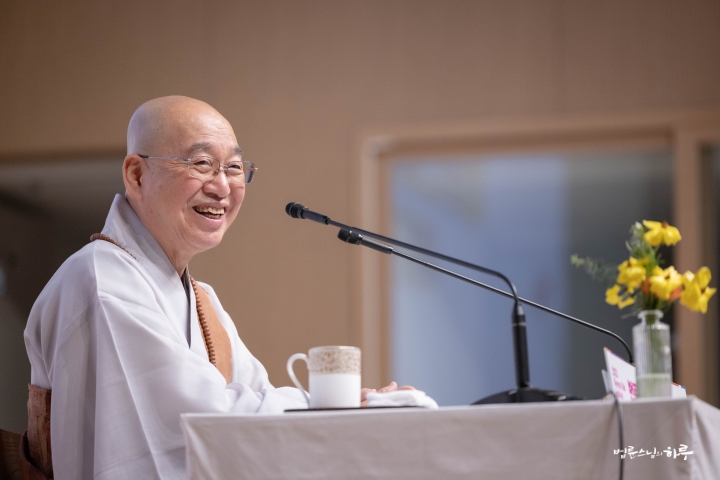
“In this case, going to church might be better than going to a temple. Start going to church from today. There’s a saying in the Bible:
‘If someone forces you to go one mile, go with them two miles. If anyone slaps you on the right cheek, turn to them the other cheek also. If anyone wants to sue you and take your shirt, hand over your coat as well.’
Just remember these three verses. Of course, I don’t think you’re ready to give your undergarments yet. But you can go ten miles instead of five, right? If your husband suggests giving 5 million won, suggest 7 million won; if he suggests 3 million won, suggest 5 million won.”
“Yes, I’ll try it about ten times as you suggested.”
“If you still feel uncomfortable after trying it ten times, come back with another question. Then I’ll give you a different prescription.”
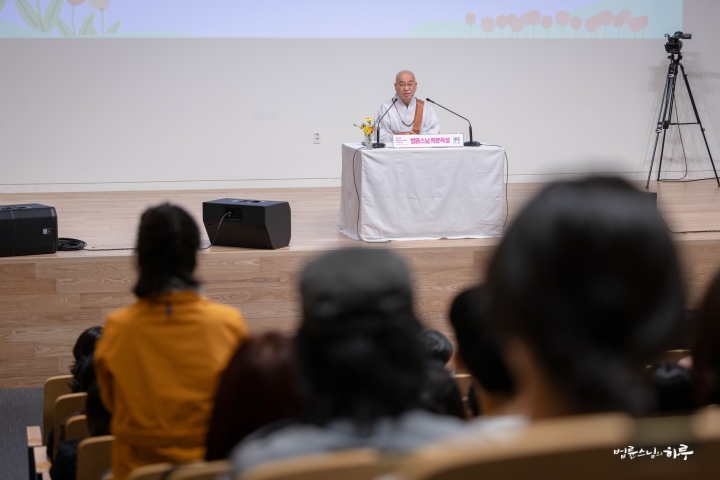

“I have one more question. We’ve been helping his parents for 30 years now. So helping them has become routine. Not just his parents but also his older brother and his wife take our help for granted. I don’t necessarily need to hear thank you, but I feel hurt sometimes.”
“That’s inevitable. You’ve been helping for 30 years. When people do something for a long time, it becomes routine. For example, people don’t always appreciate that I do these Dharma Q&A sessions for free. Now they just think, ‘We can go ask Sunim.’ If this were a session that cost 1 million won to attend, and I called to say, ‘Today is free for you,’ you would be very grateful. When something happens repeatedly, it becomes expected, and when it’s expected, people forget to be grateful. So being unconditionally good isn’t always the best approach.
It’s natural for things to become routine. So don’t expect gratitude from your in-laws. Helping your husband’s family will only end when both parents-in-law pass away. Sibling relationships are maintained while parents are alive but definitely become distant after they pass away. That’s because the parent is the mediator in sibling relationships. So just continue a little longer. You’ve already done it for 30 years, so how about continuing until 50 years?”
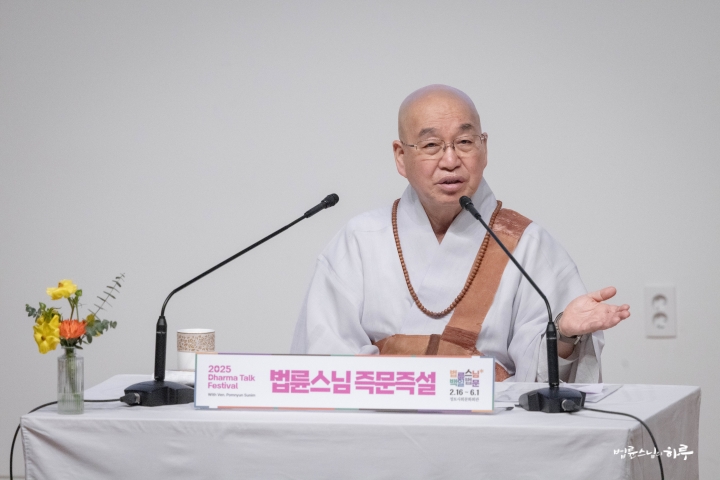
“My son is over sixty, and I want to tell my mother-in-law to stop now. She’s turning 90 this year.”
“If your mother-in-law is 90, she has at most 10 years left. Just continue for 10 more years.”
“I understand. I’ll do as you suggested, Sunim.”
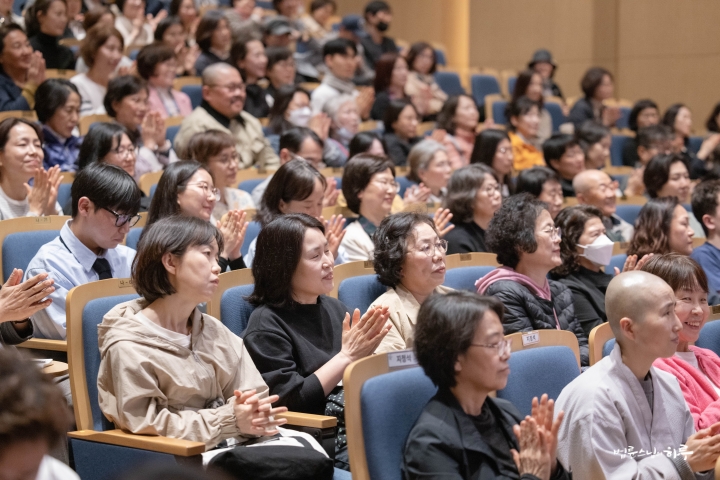
The questions continued.
After divorcing my husband, my son is living with his stepmother. Since returning from abroad during COVID, he stays at home, swears, and smokes. I’m very worried. What should I do?
I care deeply about animal welfare. I saw a dog guarding a field in terrible conditions, and I feel guilty for not being able to help.
I used to hate and resent my father who suffers from schizophrenia. Now he’s bedridden. How should I care for him?
I hated my mother so much as a child that I wanted to kill her. Now I’m seized with fear just seeing someone who resembles her. How can I manage these feelings?
I met a wonderful sister-like friend who helped me a lot. Recently, she was harmed by someone. How can I help her?
In the Vow of a Jungto Practitioner, what does “collapse of community” mean when diagnosing the world’s problems?
I’m listening to sutra lectures, but I don’t understand the term “ilsangmusang (一相無相)” in the Diamond Sutra. Could you explain it more clearly?
Many people raised their hands wanting to ask questions, but as it was nearly noon, Sunim concluded the lecture, promising to continue with the remaining questions at the next session.
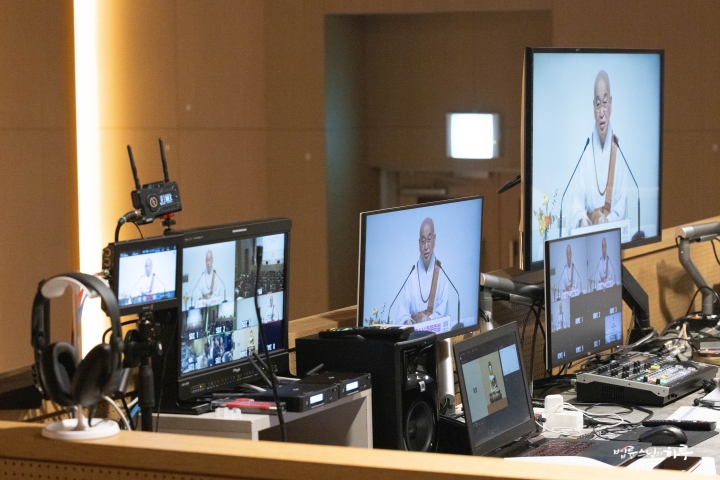
After having lunch with the Sangha in the basement dining hall, Sunim spent the afternoon organizing the office with the trainees.
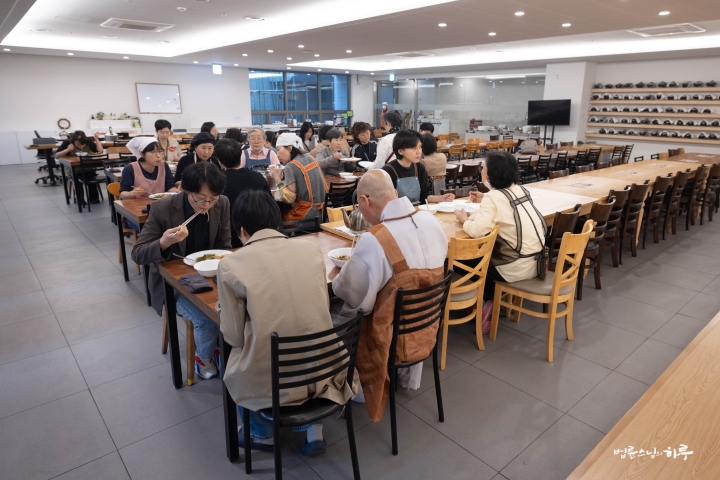

As the sun set, Sunim continued with the Friday Dharma Q&A lecture at 7:30 PM in the basement auditorium. Many citizens came to the Jungto Social and Cultural Center to attend. They registered on-site or submitted their questions before heading to the basement auditorium with light steps.

With about 5,000 people connected via YouTube and 210 people present at the venue, the Friday Dharma Q&A began with a performance by singer Seong-guk.


After reciting the Three Refuges and Words for Practice, Sunim took the stage.

Over the course of an hour and a half, six people raised their hands to engage in conversation with Sunim. One person sought advice on how to become mentally stronger, explaining that their sensitive nature made forming relationships difficult.
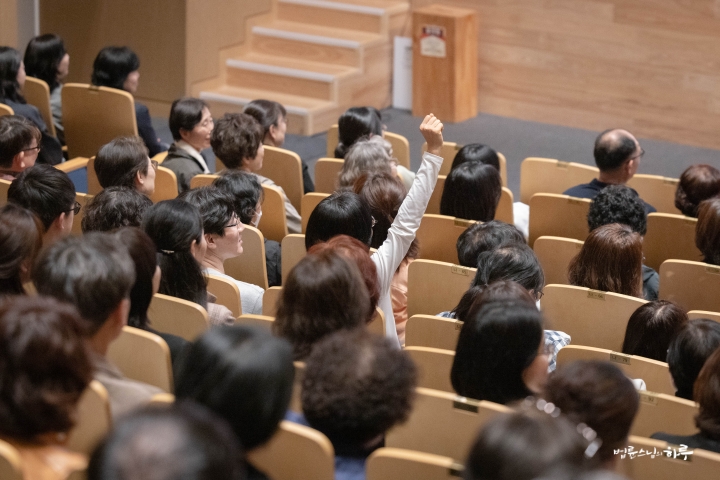
My Sensitive Nature Makes Meeting People Uncomfortable
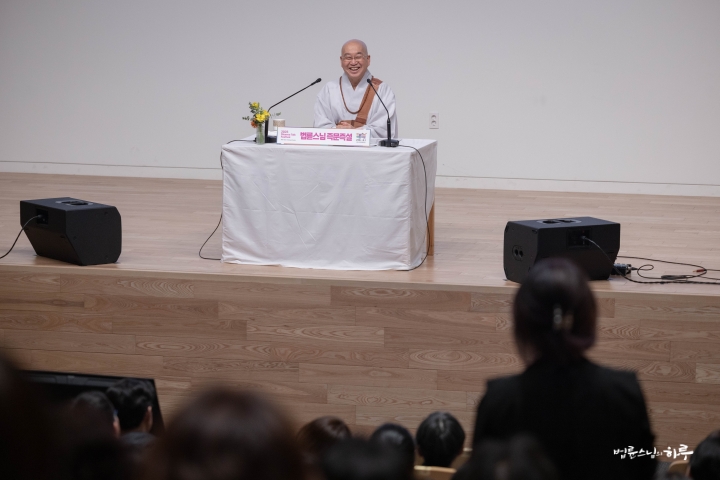
“Crying doesn’t interfere with your life at all. You just need to use more handkerchiefs. It only becomes a problem when someone who cries easily becomes fixated on the idea that ‘I shouldn’t cry.’ Crying doesn’t cause trouble for others. You’re not hitting anyone, stealing anything, using abusive language, or harassing others, so it’s not a problem at all.
Tears come from tear ducts. If it’s too uncomfortable, you could visit an ophthalmologist to have your tear ducts partially blocked. I’ve heard that people with dry eye syndrome undergo procedures to open their tear ducts because they don’t produce tears properly.
Being sensitive isn’t a problem either. Is being tough and shameless necessarily better? You’re a sensitive person who longs to be tough. You cry easily but wish you didn’t. If you just accept it, there’s no problem at all. If people ask why you’re crying, you can simply say, ‘I just tend to tear up easily.’ I cry more easily these days too. They say people tend to cry more as they get older.
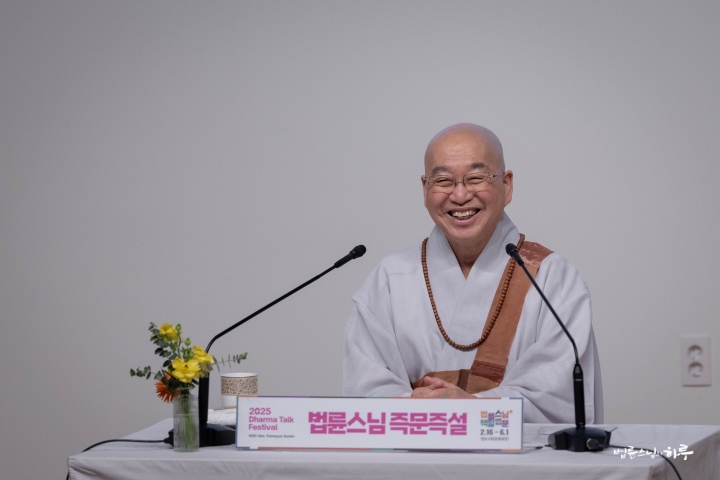
I have two chronic health issues. One is that my throat is weak, so I have a sore throat year-round. The other is that my stomach is sensitive. My digestion is slow, so I often have symptoms of indigestion. After eating, I yawn during digestion, and when I yawn, tears flow. The tears stream down so much that I always carry a handkerchief. Sometimes I tear up while watching performances, and other times I yawn during performances which causes tears. People can’t tell whether I’m crying from being moved or from yawning. In those moments, I just wipe my tears away.
You should just accept that you tear up easily and live with it. Simply accept your condition. If anyone questions it, don’t be afraid or avoid the situation—just say, “I tend to tear up easily.” Since childhood, I’ve had trouble recognizing people. I’ve been scolded many times for not greeting people. Even with people I know well, I don’t immediately recognize them, and when I meet them outside the temple, I have no idea who they are. These days, because of my throat condition, I wear a mask, which fogs up my glasses, so I go without them. When I fail to recognize someone, I simply say, “I’m sorry, I couldn’t recognize you without my glasses.” (Laughter)
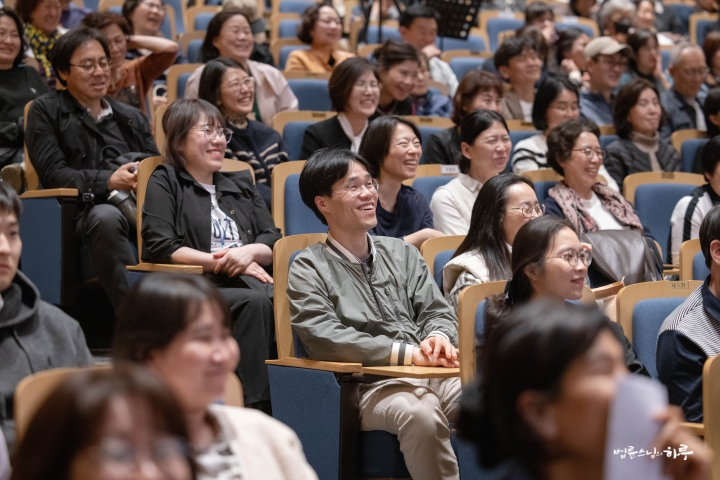
“How can I strengthen my mind? Is there a method?”
“Just as you need hard training to strengthen your body, you need mental training to strengthen your mind. To strengthen your legs, you run with sandbags; to strengthen your arms, you lift weights. Similarly, to strengthen your mind, you should live with someone who insults or mistreats you. If you endure it, you become stronger. If you live with someone who curses at you every day, you’ll eventually be able to withstand most insults. If you live with someone who constantly asks you to run errands, you’ll find it less burdensome when others ask you to do things. That’s how you become stronger.”
“I’ve experienced such insults before, but I collapsed immediately and found it difficult to get back up.”
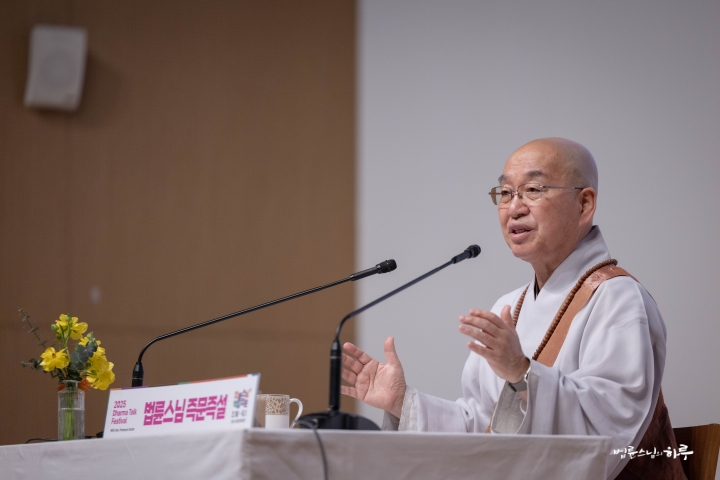
“If you want to become stronger without practicing, there’s no solution. If you truly want to become stronger, live with someone who curses at you daily and someone who constantly asks you to run errands. If you have a husband, ask him to curse at you every day. With this kind of training, you’ll eventually become immune to most insults. You’re trying to get something for free without being willing to train for it.”
“What if I keep enduring it but eventually collapse because I can’t bear it anymore?”
“Then you can stop.”
“So should I just give up and live with it?”
“Wanting to achieve something without being willing to practice for it is greed. You’re constantly being greedy instead of living with what you have. How are you tender-hearted? A truly tender-hearted person wouldn’t persistently question like this, asking again and again even after I’ve answered. A tender-hearted person would be too shy to speak up. So what you’re saying doesn’t make sense.” (laughs)
“Yes, I understand. Thank you.”
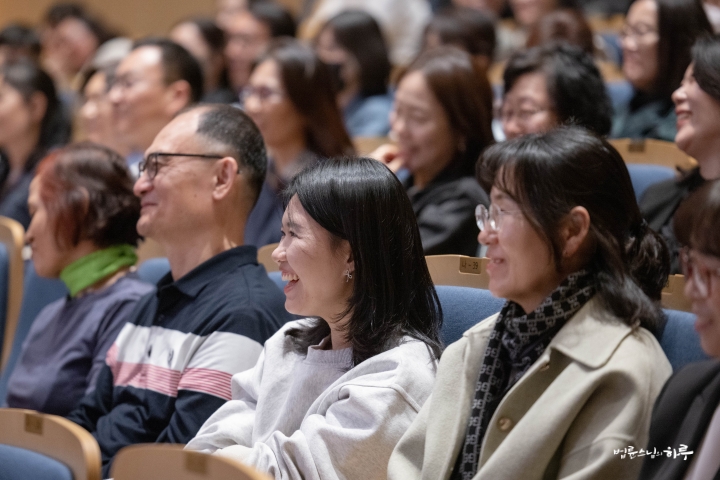
The questions continued.
I’m divorced with a child and experiencing psychological stress while dating a new girlfriend. What mindset should I have?
Since Jungto Society transitioned online, I’ve noticed conflicts between the online and offline generations. What are your thoughts on this?
I’ve been going to a temple for 30 years, but the monks there frequently suggest I become ordained, which makes me uncomfortable and avoid going. What should I do?
Buddhism says there’s no right or wrong, but I don’t understand this. If someone breaks my leg, aren’t they doing something wrong?
How can I listen attentively to others like you do, Sunim? When I listen to others, I tend to start talking about myself.
I’m generally sensitive and feel a lot of guilt. What should I do when I feel guilty?

By the time the conversation ended, it was past 9 PM. Sunim concluded the talk with the Four Great Vows, promising to meet again at the same time next week.
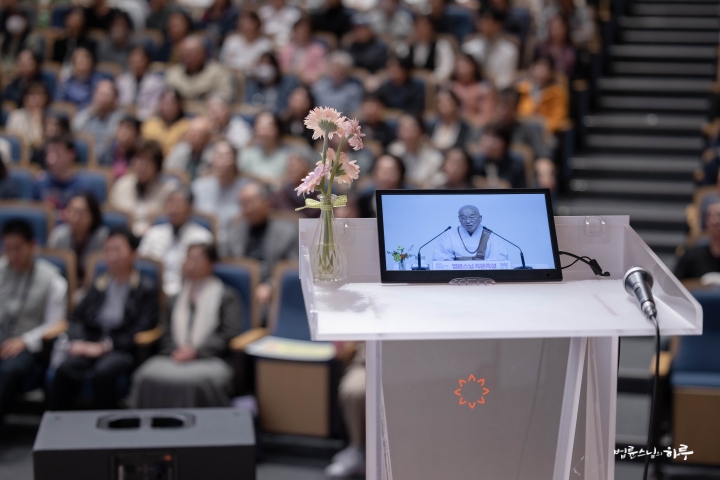
After leaving the Jungto Social and Cultural Center, Sunim immediately departed for Dubuk Jungto Retreat Center. After driving on the highway for 3 hours and 30 minutes, he arrived at Dubuk Retreat Center at 12:45 AM, concluding his day.

Tomorrow, Sunim plans to spend the entire day farming at Dubuk Retreat Center.




